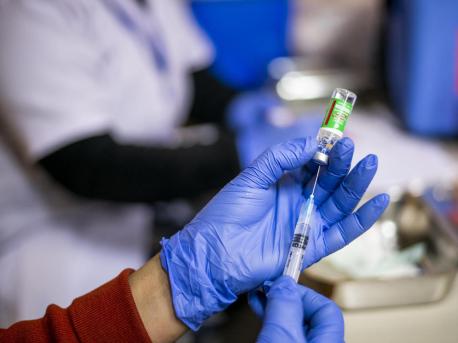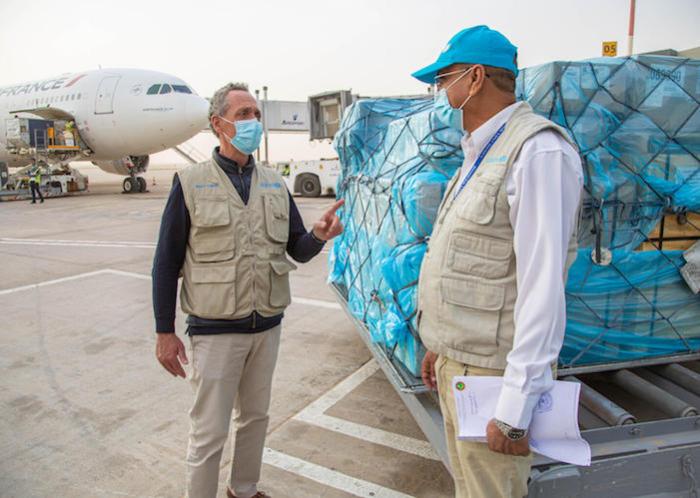
The Race to End the Pandemic
UNICEF is leading efforts to equitably distribute COVID-19 vaccines to low- and lower-middle-income countries around the world. Because no one is safe until everyone is safe.
More than a year into the COVID-19 pandemic, the largest and fastest vaccination program in history is underway and UNICEF is playing a key role, leading efforts to ensure delivery of up to 2 billion doses of COVID-19 vaccine to more than 180 countries by the end of 2021.
The whole world will remain vulnerable to the virus until countries with the weakest health systems are protected from it as well. — UNICEF Executive Director Henrietta Fore
As the world's largest single vaccine buyer, UNICEF is uniquely positioned to coordinate and support the procurement, international shipping and in-country distribution of COVID-19 vaccines for the COVAX Facility, a global initiative formed to guarantee that participating countries have fair access to vaccines, regardless of their income level.
In early February, the COVAX Facility released an indicative distribution plan forecasting the early availability of doses of the Pfizer/BioNTech vaccine and the AstraZeneca/Oxford vaccine to Facility participants. UNICEF, along with procurement partners including PAHO, will have access to up to 1.1 billion doses of vaccines for approximately $3 a dose for around 100 low- and lower-middle-income countries.
Under the COVAX Facility distribution plan, 18 countries are slated to receive 1.2 million vaccine doses in Q1 2021
According to the interim distribution forecast, 18 countries will receive 1.2 million doses of the Pfizer/BioNTech vaccine in Q1 2021: Bhutan, Bolivia, Bosnia and Herzegovina, Cabo Verde, Colombia, El Salvador, Georgia, Maldives, Moldova, Mongolia, Peru, Philippines, Republic of Korea, Rwanda, South Africa, Tunisia, Ukraine and the West Bank and Gaza.
“This release will help countries continue their preparations for vaccine distribution by providing them with details of the type of vaccine each country will receive in the first and second quarters," Fore explained. “This is, of course, just an initial tranche of COVAX vaccines. More will follow. We will continue to work on the supply agreements to meet the needs of the COVAX vaccine requirements for the first half of 2021."
.@UNICEF is launching the Humanitarian Airfreight Initiative, bringing together leading airlines covering routes to over 100 countries, in support of the #COVAX Facility.
— UNICEF Supply Division (@UNICEFSupply) February 16, 2021
Read more--https://t.co/ZOkphHGvWl@IATA✈️---- pic.twitter.com/so4vQVIeYu
UNICEF and leading airlines have joined forced to deliver COVID-19 vaccines and lifesaving supplies worldwide
To ensure that COVID-19 vaccines and other lifesaving supplies reach their destination as quickly as possible, UNICEF and leading airlines have formed the Humanitarian Airfreight Initiative. The following airlines have signed agreements with UNICEF to support the prioritization of delivery of COVID-19 vaccines, essential medicines, medical devices and other critical supplies to respond to the pandemic: AirBridgeCargo, Air France/KLM, Astral Aviation, Brussels Airlines, Cargolux, Cathay Pacific, Emirates Skycargo, Ethiopian Airlines, Etihad Airways, IAG Cargo, Korean Air, Lufthansa Cargo, Qatar Airways, SAUDIA, Singapore Airlines Ltd and United Airlines.
The airlines have committed to prioritizing the transport of COVID-19 vaccines and related supplies around the world, ensuring temperature control and security and adding freight capacity to routes where needed. The initiative will also act as a global logistics preparedness mechanism for other humanitarian and health crises over the longer term.
UNICEF country offices are supporting governments as they assess logistics
UNICEF stands ready to fully support the rollout of the first batch of COVID-19 vaccines as the drive against the deadly virus shifts into a higher gear. UNICEF country offices will support governments as they move forward with this first wave to ensure that they are ready to receive the vaccines that require ultra cold chain storage. This includes ensuring that health workers are fully trained in how to store and handle the vaccines. Many of these doses will go to health workers in urban areas, who are at the highest risk of exposure to COVID-19 infections.
The work has already begun. For example, UNICEF is providing Bosnia and Herzegovina — one of the countries that will be an early recipient of the Pfizer vaccine, which requires ultra cold chain storage — with eight refrigerators that will be able to store vaccines in temperatures as low as -80° Celsius. The first two refrigerators recently arrived and will be distributed to locations determined by the Ministry of Civil Affairs. The rest will follow as soon as possible.

In January 2021, Marc Lucet, Unicef Representative in Mauritania (left) spoke with a UNICEF health consultant during delivery of 8,000 antigen-detecting RDT tests made available to the Mauritanian government as part of a plan to combat COVID-19. © UNICEF/UN0396080/Pouget
UNICEF is pre-positioning vaccination supplies and readying cold chain storage
Over recent months, UNICEF has laid the groundwork for the global COVID-19 vaccine rollout by:
- pre-positioning a billion single-use syringes and 5 million safety boxes for syringe disposal
- working closely with airlines and other partners to make sure that all the necessary logistical and planning arrangements are in place
- supporting governments and partners in developing national plans to assess their logistics, including planning, coordinating, budgeting and preparing their health facilities and cold chain ahead of vaccine delivery
In addition to the procurement and delivery of vaccine doses, UNICEF plans to deliver 245 million therapeutics and 500 million tests by the end of 2021. UNICEF and partners are also working to address the global infodemic through national action plans to rapidly counter vaccine misinformation and build demand for vaccination.
With donor support, UNICEF can continue fighting the novel coronavirus while maintaining the essential programs children need to survive this crisis and grow up healthy, happy and hopeful about their future. Please donate today.
Top photo: In January 2021, a nurse prepares to administer a COVID-19 vaccine at Sitaram Bhartiya Institute of Science & Research in New Delhi, India. © UNICEF/UN0402782/Reddy
HOW TO HELP
There are many ways to make a difference
War, famine, poverty, natural disasters — threats to the world's children keep coming. But UNICEF won't stop working to keep children healthy and safe.
UNICEF works in over 190 countries and territories — more places than any other children's organization. UNICEF has the world's largest humanitarian warehouse and, when disaster strikes, can get supplies almost anywhere within 72 hours. Constantly innovating, always advocating for a better world for children, UNICEF works to ensure that every child can grow up healthy, educated, protected and respected.
Would you like to help give all children the opportunity to reach their full potential? There are many ways to get involved.





